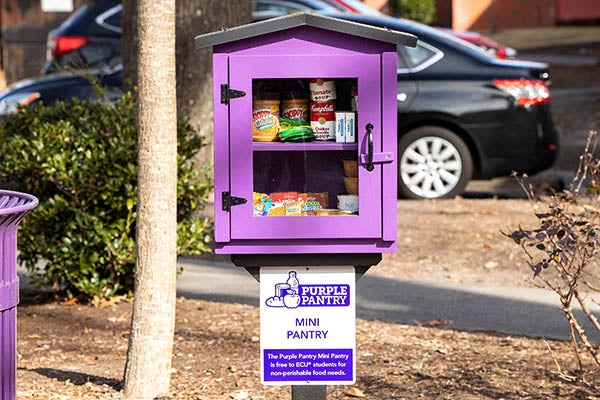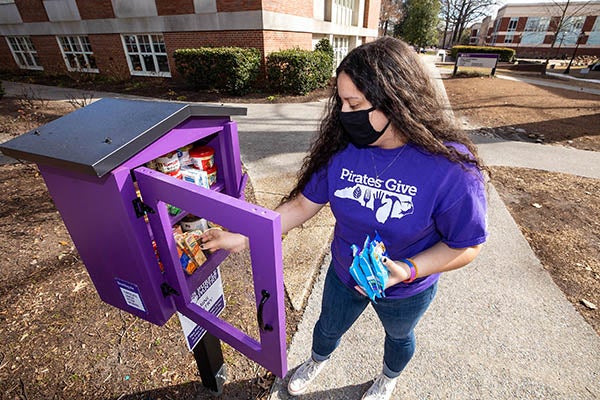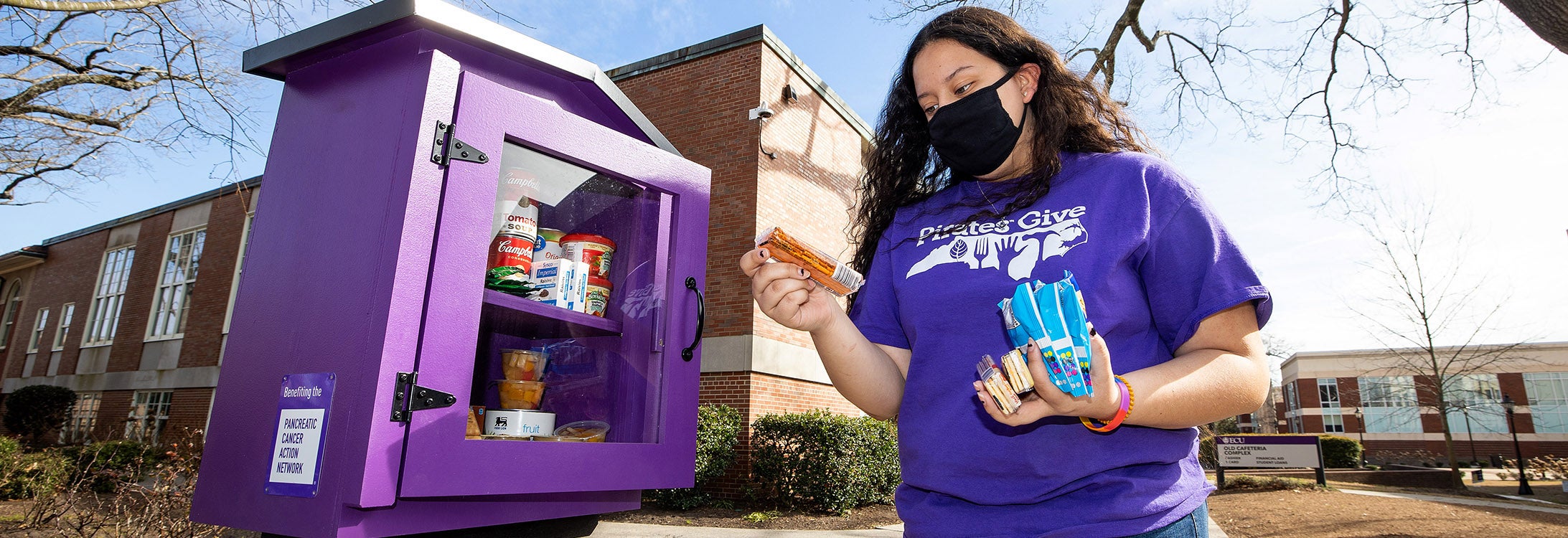FOOD AND FUNDS
New Mini Purple Pantry, Emergency Fund help ECU students during pandemic
The Purple Pantry is open on campus to help East Carolina University students with food insecurity, and now those students will have access to free food 24 hours a day, seven days a week.
ECU’s Center for Leadership and Civic Engagement (CLCE) recently installed a Mini Purple Pantry box off the walkway between the Old Cafeteria Building and Joyner Library. It’s just one way students in need can get help on campus, with the Students’ Treasure Chest and Student Emergency Fund offering options for those with financial emergencies.

The Mini Purple Pantry is located off the main walkway near the Old Cafeteria Building between Joyner Library and Mendenhall. The goal is to install three or four of the boxes on the main campus as well as the health sciences campus.
The Purple Pantry in the Main Campus Student Center is open 1-5 p.m. Monday through Friday, but the Mini Purple Pantry box provides a place for students who are simply walking to and from classes to grab a jar of peanut butter, a can of soup, breakfast bars, a package of crackers or other ready-to-eat items.
“ECU students can grab items from the Mini Purple Pantry, with access to them 24/7,” said Lauren Howard, assistant director for CLCE.
Howard said CLCE student volunteers will stock the Mini Purple Pantry with popular items from the larger pantry on Mondays, Wednesdays and Fridays.
The Purple Pantry received a $1,000 grant from the Carolinas College Hunger Summit to implement the Mini Food Pantry. Howard said the plan is for three or four of the mini pantries to be located on ECU’s main campus and the health sciences campus.
Howard said the COVID-19 pandemic has not decreased student needs for food, with about 1,400 pounds distributed during the fall semester.
“We remained steady with our numbers,” she said.
However, the pandemic has caused CLCE to adjust its methods of helping students. When the pandemic first shut down the campus in March of last year, the Purple Pantry began using Pirate Packs, a reusable bag of 10 to 15 pounds of food and hygiene items, to help students. About 300 were delivered in the first five months of the pandemic. Students can request Pirate Packs each week through the Engage platform and can pick them up from 9 a.m. to noon each Wednesday.
For those wanting to donate or volunteer, or for those wanting information about the Purple Pantry, email purplepantry@ecu.edu or call 252-737-1669. Donations can also be made through the pantry’s Amazon Wishlist.
Treasure Chest and Emergency Fund
Students in need of a financial safety net can apply for funds through the Students’ Treasure Chest and the Student Emergency Fund.
“Through our application process, we are able to connect the students with on- and off-campus resources and other financial aid options, and provide funding when available to assist with emergency situations,” said Lauren Thorn, associate dean of students. “We have had requests range from car repairs to medical bills, and especially during COVID-19, assistance with food, books, technology and other daily needs.”
Thorn said student need has increased since the pandemic hit, especially with some students losing their jobs.

The Mini Purple Pantry is stocked with cans of soup, breakfast bars, jars of peanut butter, crackers and ready-to-eat items on Mondays, Wednesdays and Fridays.
“In previous years, we maxed out at around 110 applications for the entire academic year. This academic year, we are already at 140 and still have the entire spring and summer semesters to go,” Thorn said. “We are noticing many more requests for technology purchases and repairs, which is understandable given the online learning environment.”
Thorn said through CARES Act funds, representatives from the Dean of Students office, university scholarships and financial aid distributed more than $9.6 million to more than 10,000 ECU students. Other foundation and institutional funds such as the Student Emergency Fund met the requests of another 730 students, providing about $650,000.
Since the end of March, ECU has raised $226,282 in emergency funds, which includes $53,000 from the University of North Carolina System.
Students can apply through the Students’ Treasure Chest webpage. Information about donating to the fund is also available on the site.
Thorn said not every request is granted. Those that are rejected are usually connected to other resources, such as the Joyner Library loaner program for technology. She said students and families should have FAFSA forms completed for 2020-21, which will help in determining eligibility for additional incoming federal and state funds for student needs.
“We could not have done this without the amazing support of our donors, community members and alumni,” Thorn said. “Through major campaigns like Pirate Nation Gives and other advancement opportunities, we hope to share more stories about how the generosity of our ECU community has helped our students continue to thrive and flourish, despite the significant challenges of this past year.”
Related:
Student Emergency Funds: ECU raises nearly $50K to help students affected by coronavirus
Purple Pantry: Partnership aims to address food insecurity on campus
